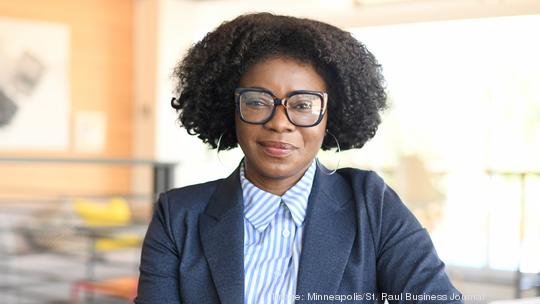
A Black woman-led startup looks to use its software to drive change in the criminal justice system. However, while it is currently based in Minneapolis, it doesn’t plan to remain here much longer.
SIID Technologies aims to use machine learning technology to facilitate racial equity, fairness and accountability within the judicial and law enforcement fields. Now in the prototyping phase, the startup’s ideas have continued to garner interest through accelerator programs inside and outside of the state.
It plans to launch its software pilot program in the first quarter of 2023, said founder Eri O’Diah. By then, however, the startup is likely to relocate to another city – a decision driven by a struggle to receive funding here.
“We have had positive traction this year,” O’Diah said. “But we've really struggled in this space.”
O’Diah founded SIID, which stands for social impact identification, in 2019 initially as a software to address unconscious biases in marketing. After the murder of George Floyd in Minneapolis in 2020, O’Diah decided to focus instead on racial biases in criminal justice.
“The last two years, we've really talked about taking action,” O’Diah said. “My way of taking action is using the skills that I've gained from the marketing space and also from the tech space to drive change.”
She added, “I badly want to change the outcomes of police interactions for everyone, but most importantly, for people of color.”
An initial focus for the software will be working within criminal technology systems to speed up processing for backlogged cases, which can disproportionately affect Black Americans, as they are incarcerated at a higher rate than their white counterparts, according to a 2020 Pew Research report. The software, which uses a natural language processor, is also intended to better identify recidivism rates. City attorneys, county attorneys, municipalities and courts are the target customers, she said.
SIID has a team of four employees, including O'Diah, all based in Minnesota.
SIID has recently been part of several entrepreneurship programs, including Beta’s 2021 fall cohort, MIT Solve’s rethinking public safety incubator, gener8tor’s gALPHA justice tech program and the Minnesota SBIR/STTR Accelerator, according to the company’s LinkedIn page. SIID was also a semifinalist in the 2022 Minnesota Cup.
Last month, the company won a pitch-out competition in Atlanta, from which it will receive connections to advisers and investors thanks to the Atlanta-based social impact pre-accelerator Goodie Nation, O’Diah said.
However, funding has remained a struggle, she said. So far, the company has received about $5,000 in funds.
O’Diah attributes this difficulty to local investor limited risk-taking – particularly for early-stage startups like SIID’s that require capital to develop its technology – as well as a larger focus on mentorship over funding and the same racial biases her company hopes to combat.
According to recent data by Crunchbase, U.S. startups with at least one Black founder received just 1.2% of overall venture dollars in 2022 through mid-June.
“We’re expected to innovate … like Google, without the Google dollars,” she said. "The ecosystem, in my opinion, in my experience, is not conducive to innovation, especially for women and BIPOCs, because the expectation is that you should have the funds, the time and if you don't have either, then there's something wrong with you.”
O’Diah said she is considering moving to Atlanta or another major city on the East or West Coast. SIID is also now accepting donations.
Alex West Steinman, co-founder and CEO of The Coven coworking spaces in the Twin Cities, said SIID’s experience is a common one for entrepreneurs of color. She pointed to the exit of Clarence Bethea, who is Black and the then-CEO of Upsie, from Minnesota last year.
"It's devastating to lose Black and Brown founders to other markets,” which already make up a small group in the ecosystem, she said.
While there are opportunities and initiatives to support Black entrepreneurship in the Twin Cities, West Steinman said, "[It's] going to need everybody to be doing their part in this space."
A previous version of this story incorrectly stated Clarence Bethea's current role at Upsie as well as the company's location. Bethea is no longer CEO of Upsie. He left Minnesota last year, not the company.



